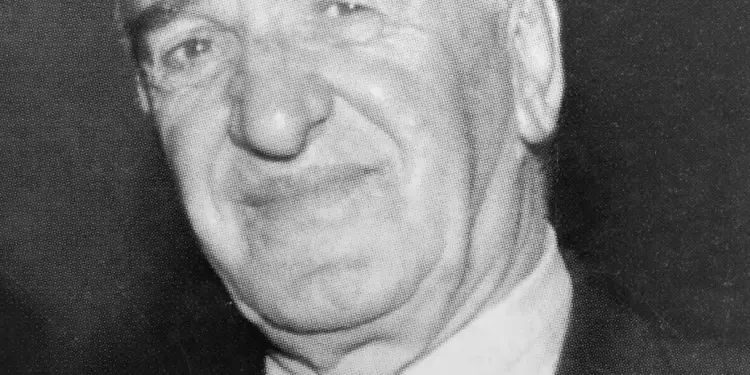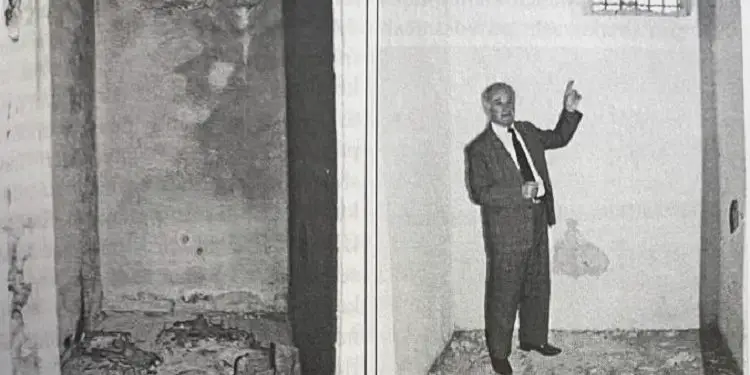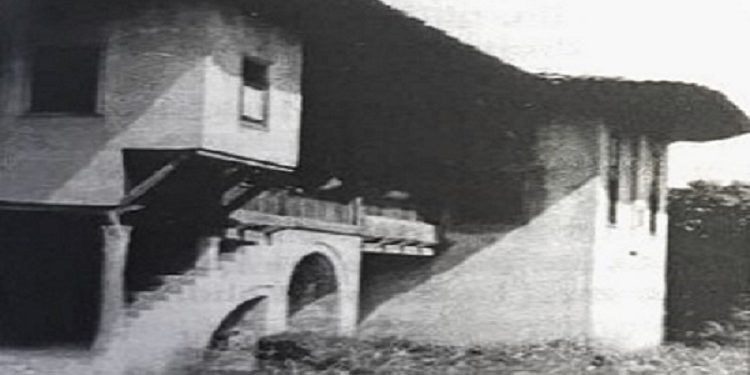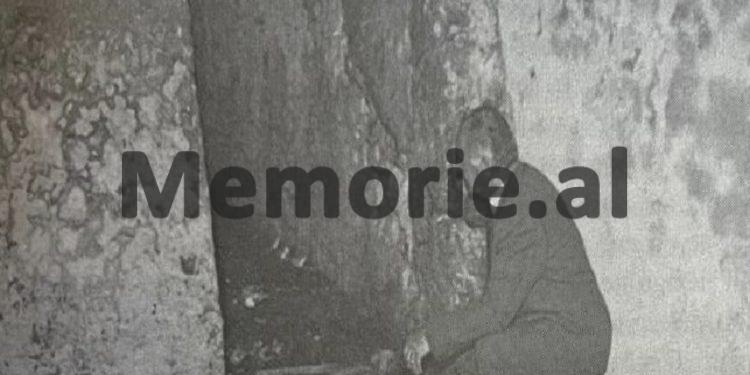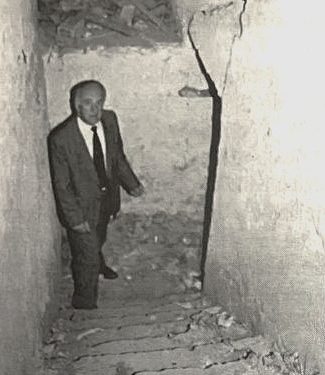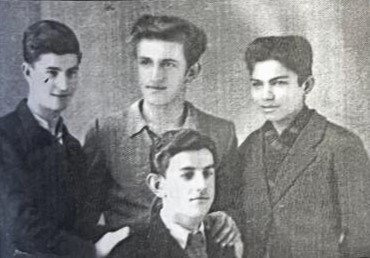By Ahmet Bushati
Part fifty
Memorie.al/ After the flag was altered in 1944 with the addition of the communist star, Shkodra transformed into a center of resistance against the regime, paying a high price for its tradition of freedom. By April 1945, high school students, already feeling betrayed by the promises of the war, gathered to oppose the new terror that imprisoned and killed innocent people. Communism turned Kosovo into a province of Yugoslavia, while Shkodra was punished for its “historical crime”- its defiance against invaders. The “Postriba Movement” became a tool to suppress all dissent, plunging the city into an unprecedented spiral of suffering: imprisonments, executions, and the destruction of families. The high school students, alongside citizens, became symbols of resistance, while some “young communists” turned into tools of the State Security, leading to expulsions, imprisonments, and internments.
Four times, Shkodra rose in armed rebellion, but history forgot these battles. This book is written to remember the countless prisoners, the tortured, the killed, and the parents who suffered in silence. It is a warning against dictatorship and a plea for future generations not to forget the sacrifices made for freedom.
Continued from the previous issue
In the Footsteps of a Diary
One day, a thin, very dark-skinned man from Dukagjini, whom I was seeing for the first time, was digging in front of me. He worked well and silently, and I didn’t even manage to learn his name, since I saw from the beginning that he didn’t want to talk. The whole long day passed like this: he was digging for his group, as I for mine. Towards the end of the working hour, I had finished my work in front of him and sat down, watching him give the final touches to his scarp, and it wasn’t long before, to my great surprise, I saw that while he was about to direct the pickaxe towards the scarp as before, it would slip out of his hands and back, and he himself would fall dead with his back to the ground.
But during those last days, when we were once returning from work to the Camp, among the crowd, somewhere in front, I would spot Uncle – Hilmi Kamata – with a man on his back, who was hanging down to his waist, as tall as he was. I reached him quickly and not without concern, I asked him: “What is this, Uncle?” – And he, under the heavy weight of the dead man that had twisted his head and neck, answered me with raised eyebrows and, intermittently, said: “Zefi, Ahmet, Zefi”! As we walked, another prisoner took Uncle Zefi off his back and, a short distance away, carried him himself. Meanwhile, Uncle started telling me:
“I was walking with X people, when Zefi approached me, asking for a cigarette. He hadn’t even taken ten steps with the cigarette lit, when a piece of the blanket fell to the ground”! Zefi, although a citizen of Shkodra, had been an ordinary prisoner of the Tirana prison. He was quite tall and had a good voice. There at “Ura e Bonos”, we had heard him sing continuously, and above all that song; “I got on the steamboat.”, so much so that many prisoners would mistakenly say that he was its author.
As helpless as he was, for a short time he had also served as the camp’s bellboy. No one came to him from home, and he would be one of those ordinary prisoners, who would suffer so much from hunger, that one day he would even die from it! Among the good policemen, we no longer saw Teufik, but Shtjefni from Kallmet of Zadrima did, who even in those difficult situations, from that high bodyguard position where he usually served, continued to smile at us, like one of our own who was holding on and was.
During the month of Nandori, it rained often. If the sky became cloudy during working hours, or even if a light rain had started to fall, none of the command authorities, including the commander himself, dared to return us to the camp. They wanted the sky to close in on them from all sides and the rain to increase, so that then one of them would order our return to the camp. And in such a case, until we had covered the distance of 4-6 km. The road that recently separated the camp from the work front would have soaked us, and if, unfortunately for us, the rain stopped, and especially if a patch of sky were to open up, the “meteorologists”, like Lieutenant Ademi and his minions, would immediately order the camp bell to be sounded, followed by the police sirens one after the other, without missing the camp bell, which together would signal to go out to work once more. It happened several times that on the way, a second rain, perhaps even heavier than the first, would overtake us, and when we finally returned to the camp, many of the prisoners, having nothing else to do but change, would crawl naked into their mattresses, and we would take off our robes, to dry them, and place them between the covers above.
All prisoners without exception, especially in the days before the end of the camp, were pushing with “souls in their teeth”, but with the hope that from one day to the next, they would be returned to prison. Our families also believed so and, in the end, that day came: one day, as soon as we had left work as usual, the order that; “we should take our work tools with us”, would spread rapidly and enthusiastically among the prisoners, making each one, breathing freely, say to himself that that camp of great suffering, of many serious diseases, often incurable and paid for with several human lives, had come to an end. The joy was irresistible, which would be expressed with shouts, with the clashing of tools and work on the ground, as well as with long hugs between the prisoners.
While we were returning to camp late that afternoon, loaded with work tools, parallel to us, at a distance of 40-50 meters, along the embankment of the canal, Lieutenant Ademi walked alone and with his head on the ground, who no doubt must have suffered greatly from our joy. If he did not continue to contain his anxiety, after a while he would call the police chief and order the prisoners to carry the handcarts on their backs, something he could not even imagine. The prisoners, for their part, know that he no longer had any power over them, could hardly wait to oppose such an order with disobedience and a kind of noisy protest, continuing their way to camp even more joyfully. The idea that they would be returned to prison the next day had revived and encouraged many prisoners who remained “skin and bones”!
By a most unexpected and undesirable coincidence, that after lunch my family, having lost hope of our quick return to Shkodra, had brought me food and at my uncle’s dinner, a strange and funny thing would happen to us: Recently, our table had been expanded with some more friends, in order to include as many of our friends as possible, whose families were unable to come to their aid. As a result, the food had run out before the usual deadline. Of the members of the table, I had only uncle in the barn.
When I pulled the food, it had been an hour or two since nightfall, and the time allowed to go from one silo to another had passed. In the absence of the other companions at the table, Uncle and I decided not to touch the food, but to eat only a watermelon. Sitting on a mat in front of the silo door, we set about eating the watermelon, which we would finish at the first bell, a bell that informed the prisoners that they had to take their last measures before the second bell rang, after which no one could stay outside. Surprisingly, Uncle and I were unable to move after the first bell, nor after the second.
The watermelon had blocked us! Our stomachs, which seemed to have shrunk even more over the past month, that night were so swollen from the watermelon that we remained in place as if nailed to the wall. No one who could have given us a hand would move. All that trouble had given us a gasp, which only increased our impasse. It was fortunate that that night the guards with sticks in their hands came out late, or did not come out at all, as it was the last night. However, we finally managed to crawl inside the door of the silo.
Throughout that night, I could not sleep, not from the joy that the next day we would travel to Shkodra, but from the sacks full of food that were above my head, which although I had them on my head, I could not touch without the presence of my other companions at the table, who were just as hungry as I was. After waking up later than the other days – but of course it was always at night – on the orders of a bad operative with the rank of aspirant, who I think had the name Koço, he had held a meeting with a group of prisoners, at which time, as I would hear later – prisoners like Ruzhdi Çoba, Martin Kola and others had vented a lot of their revolt, reminding that bad operative that one day he and his friends would answer for the treatment they had given us.
The unpaved road to Beden was badly damaged by the many derailments, so much so that we were forced to walk several kilometers with our luggage on our backs to a place where the cars would be waiting for us. I, for my part – perhaps from the joy of returning to the Shkodra prison – felt so strong that throughout the entire journey, although with a fairly large bundle on my head, along with very few others, I would constantly be at the head of the endless line of prisoners.
We felt happy that we were leaving behind that camp, whose suffering, although far from that of the Sigurimi, would still be great; We were happy that after ten months in the camp, we would meet our beloved families and relatives, our prison comrades, as well as the younger students, whose imprisonment we considered with pride as a continuation of the resistance and struggle of that high school, where movements for freedom and social emancipation had traditionally been born and brought to life. We walked the short route into the city of Lezha, as well as the one at the entrance to Shkodra, with patriotic songs, as always taking advantage of the policemen who were not from our prison.
Meanwhile, we, then and later, remembering the suffering of that camp, would continue to speak with pain about its victims, about those who were sick on that occasion and would never recover, and about those others who died because no one happened to help them even a little with food, about which we would later say among ourselves: That many of them would not have gotten sick, let alone died, if they had had two to three hundred grams of bread more than their daily ration; if the requirement for fulfilling the norm had been at least one cubic meter less; and if, also, they had been allowed to rest whenever they got sick, and finally, if they had taken medicine for such cases.
Back in the Shkodra prison
We found the prison director and deputy director – just as we had left them – Major Xhelo Fasllina, from the villages of Vlona, and Rasim Bashkina, a wise and good Shkodra native, who neither spoiled nor repaired anything, and who had been given the duty of deputy director of a prison as a reward for his participation in the war. In the first days after returning from the camp, they initially placed me in room no. 1, where without going into the names of the prisoners, I will only remember that of a priest, namely that of a certain Dom Nikollë Kimzet, from the village of Lejthizë, somewhere near Spaç i Mirdita, who had completely whitened hair and a thicker beard than anyone else there.
Convinced that he was of the same blood as the Bushatli, he immediately and strongly approached me, as if he were a cousin of several generations that he thought he had. With great desire he would talk to me about the branches of our common tribe scattered throughout Mirdita, and after him, also throughout Kosovo, on which occasion he would say: “Because Ahmet, our cousins, we have them here and there”. Dom Nikolli was a simple and kind man, as well as very sincere. In those days he would complete his sentence and be released from prison, and several times, talking about his release, he would say to me: “Met, it won’t be two or three days after prison and I’ll be on the other side”. And indeed, that’s what he had done, when upon leaving prison, with the help of his two nephews, he had quickly crossed the border and gone to Kosovo.
Once, as if to laugh, I said to him: “Dom Nikollë, you are different from other priests in some ways, and they gave you a rifle, what does that have to do with communists?” And there and then, raising two “motley” eyebrows high above his wrinkled forehead, which ended in two scattered bangs on the sides and also frowning and shooting out two round white eyes, he would bring his face close to mine and answer me as if with nerves: “They gave me a Met rifle, I’ll kill the communists”!
In the room for the sick with tuberculosis, besides Sabri Kazazi, Lem Deda, Ndue Fusha, Lekë Harapi, Malo Cani, Luigj Mikeli, Rexhep Bërdica, Qemal Dibra and some others, I would find Nush Simon there with great regret and pain. The disease of tuberculosis had defeated him in health and morale, and there was nothing left of Nush, so lively and optimistic as he had been. He had surprisingly turned into a man short and sad, with a hoarse voice and who coughed from time to time even while talking to me. Others told me that Nushi had become ill because of his own carelessness, that after every daily game of volleyball, even though he was sweating profusely, he had constantly gone under the shower to cool off and drink water, from which water he had then caught a cold.
Two years ago, prisoners in a room were not allowed to “give and take” or even talk to their companions. Such a hardship had been imposed more than others on the sick, generally tuberculosis patients in room no. 10, and especially on the poorest, who were usually from areas far from Shkodra, condemned not to even receive the help of the sick from Shkodra, because as long as there was a former captain from Mirditet, named Bardhok, who had “sold his skin” to the devil in the prison administration, he would constantly watch to see if any of the sick from Shkodra, contrary to the regulations and orders of the administration, helped their friend who had nothing to eat, who would generally be a foreigner. Thus Lekë Harapi, also sick in that room, would tell me, among other things, how the two brothers from Lumja, for all their character, when the meal came to them to eat, as always, they would approach each other head to head with their companions and, brought with their backs to the others, would dip the bread only in salt.
Leka would also remember on this occasion another good man from the Berat area, named Jaho Ullini, who would dip the bread in salt for a long time, and that when one day he died, the prison administration, in order to torment the sick in the room, would not take Jaho’s corpse out, even though over time it was stinking so much that the sick in the room would stay submerged under the covers the entire time.
Of the sick we had left, we did not find alive a certain Sheh Mersini from Bicaj i Luma, who in fact had not warned us about anything, but as Elez Troshani would later tell us – who, as you know, worked as a doctor – his premonition of death had been strange. Like Elez, Sheh Mersini had been so religious that neither day nor night had been enough for him to pray to God.
He suffered from asthma and one day at the beginning of the week, he had whispered in Elez’s ear: “Elez, I don’t want anyone to tell me, but I have to die on Saturday.” And in addition, he had left Elez the trusts, to distribute among his friends on the river, the few belongings he had with him, while he would leave the tobacco box, the “kamish” (chibuk) and the tapestry for his son. Elez, being Elez, had left Sheh Mersin with a smile of pity for him, saying to him: “Good, good”, just to please him and not to remind him of his “fairy tales”.
Sheh Mersin’s numbered days were coming to an end and he himself was seriously preparing himself, so that he could wait the predetermined day of death with the discipline of a devout believer. So on Friday, the day before his death – as after him – he had asked Elez to arrange for him to perform ablution with the police officer the next day, that is, to cleanse himself before praying to God for the last time, which Elez, as with everything else, had taken upon himself, as well as to bring Sheh Ali Bogdani to “sing” to him, that is, to pray to God for his soul on the verge of death.
Elez had fulfilled everything on time and Sheh Mersini, to Elez’s own surprise, would actually die that Saturday. After a stay of not many days in room no. 1, I would be moved down to room no. 7, to now be a member of the sofra with Çesk Gjeluc, Gjovalin Zezaj and Ahmet Kopliku.
In a prison cell, out of ten, it was not necessarily said that you would find any of those comrades with whom you were sentenced, but that nevertheless, prison, as always, would bring people together with whom you would become friends and brothers, even if you had not known them before. Among the new students of the prison, there I would find Et’hem Bakalli, one of my best friends for life.
Shortly after we had returned from the Bedeni camp, some nationalist prisoners from the Tirana prison were brought to our Shkodra prison, such as; Sejfi Vllamas, a prominent activist of our national cause; Hasan Tatzati, a mathematics professor and exponent of the National Front; Teufik Hysen, former president of the first instance court in Tirana and a well-known legal scholar; Hysejn Meçen, a Mr. Krujet, as well as another Krutan, Abdulla Berber, a former student of the Tirana gymnasium and from a very young age a fighter near the Bazi of Canes, and there in prison, one of our good friends. There were other prisoners transferred from the Tirana prison, but since we didn’t have them in the same room, some of them must have passed us by without even recognizing them.
However, I also remember a certain Ali Vadejet, who had once been a engineer officer and a fighter with weapons in his hand for Legaliteit, and I also remember a tall man, who I think had the name Ihsan, who had been the Albanian announcer for Radio-Bar until recently and who, although he was a good man, would not convince anyone of his exaggerated belief in the rapid change of the situation, which according to him, could happen at any moment: “Even now that we are talking, the change could happen”, he would say several times. Memorie.al
Continued in the next issue




